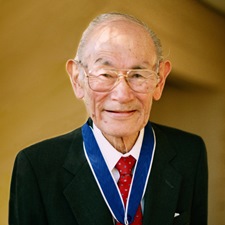Post by Matthew Liponis, J.D. expected May 2018, Elisabeth Haub School of Law at Pace University.
 On January 30, 1919, Fred Toyosaburo Korematsu was born. This date is totally inconsequential from a legal perspective. But it is poetic. It happens to be almost exactly 98 years before the Trump Administration published one of its first Executive Orders, intended to “protect” the United States, from foreign terrorists. The Order, which blocked the entry of immigrants from seven countries, suspended the U.S. Refugee Admissions Program (USRAP) for 120 days, the admission of Syrian refugees indefinitely, and the entry of foreign nationals of Iraq, Iran, Libya, Somalia, Sudan, Syria, and Yemen for 90 days. It was signed just three days before Fred Korematsu’s birthday.
On January 30, 1919, Fred Toyosaburo Korematsu was born. This date is totally inconsequential from a legal perspective. But it is poetic. It happens to be almost exactly 98 years before the Trump Administration published one of its first Executive Orders, intended to “protect” the United States, from foreign terrorists. The Order, which blocked the entry of immigrants from seven countries, suspended the U.S. Refugee Admissions Program (USRAP) for 120 days, the admission of Syrian refugees indefinitely, and the entry of foreign nationals of Iraq, Iran, Libya, Somalia, Sudan, Syria, and Yemen for 90 days. It was signed just three days before Fred Korematsu’s birthday.
The legal impact on individuals of a specific national origin (without any further evidence of a threat to national security) harkens back to a dark time of American history. Fred Korematsu, the American civil rights activist who challenged the legality of Japanese internment in 1944, would be concerned about the state of social progress in 2017. In World War II, the United States interned (put into prison-like camps) between 110,000 to 120,000 Japanese residents, 70,000 of whom were American citizens. No Japanese residing in the United States—neither citizen nor immigrant—were charged with having engaged in espionage in the Second World War. In Korematsu v. United States, 323 U.S. 214 (1944), the Supreme Court upheld the Japanese internment. That decision has been overwhelming condemned. Perhaps Justice Frank Murphy in dissent said it best. He described the rounding up of Japanese in America as “go[ing] over ‘the very brink of constitutional power,’ and fall[ing] into the ugly abyss of racism.”
Legal action against President Trump’s policy was almost immediate. Several lawsuits were filed around the country. Concerned, among other things, that the order would affect families and its economy including Microsoft and other tech companies in the state, Washington (joined by Minnesota) filed a civil action on January 30 against President Trump, alleging that the Order violated (1) Equal Protection and Procedural Due Process under the Fifth Amendment; (2) the Establishment Clause of the First Amendment; (3) the Immigration and Nationality Act, for discriminatory visa handling and for wrongfully denying asylum; (4) the Foreign Affairs Reform and Restructuring Act of 1998; (5) the Religious Freedom Restoration Act; and (6) the Administrative Procedure Act by denying foreign nationals with validly issued visas the right to enter the United States.
Sitting in the Western District of Washington, James Robart, a district court judge appointed by President George W. Bush, stayed the order in its entirely, reasoning in part that the order “adversely affect[ed] the States’ residents in areas of employment, education, business, family relations, and freedom to travel.” The Trump administration appealed the stay to the Ninth Circuit Court of Appeals. That court upheld the district court, noting that “the procedural protections provided by the Fifth Amendment’s Due Process Clause are not limited to citizens.” The Ninth Circuit observed that such protections “also apply to certain aliens attempting to reenter the United States.” Because, however, of the “sensitive interests involved [and] the pace of the current proceedings,” the court based its decision on Due Process and did not reach the Establishment Clause or Equal Protection claims.
The Trump administration decided not to challenge the Ninth Circuit’s decision and is rewriting the executive order. Litigation is expected to follow that order as well. As we balance considerations of national security and civil liberty, it is important to remember our history. Fred Korematsu and the internment of the Japanese cannot be forgotten. They must serve as lessons. Because the denial of Muslim immigrants on the basis of religion or national origin is not only contrary to humanitarian principles, but to the American spirit itself.